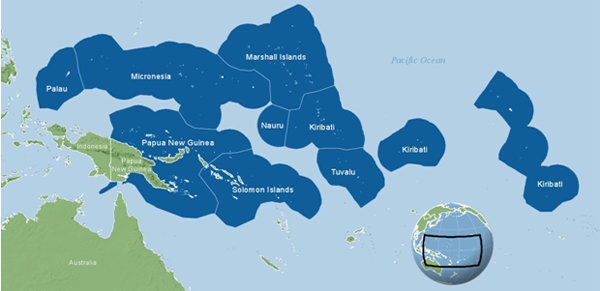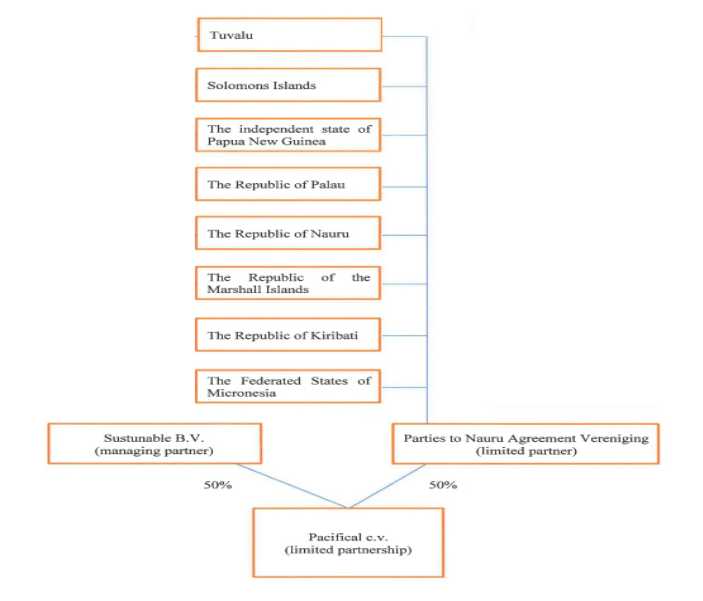The Development of Pacifical Co-Branding in the Parties to the Nauru Agreement
The Parties to the Nauru Agreement (PNA) have been under the spotlight for the conservation and management of tuna resources in the Western and Central Pacific Ocean. As custodians of one of the worlds richest tuna fishing grounds, the PNA have introduced the Vessel Day Scheme (VDS) to cap fishing effort by selling fishing days to distant water fishing nations and maximising economic returns. The implementation of the VDS has shifted the balance of power from distant water fishing nations to PNA states, who now determine the terms and conditions of fishing in their respective waters.
Figure 1: Geographic location of the PNA Member countries

In 2012, the PNA attained Marine Stewardship Council (MSC) certification for its free school skipjack tuna fishery. The key objectives of the MSC free school tuna certification is to shift fishing effort away from fishing aggregating devices (FADs), and to ensure the overall sustainability of tuna resources in the long term. In the Western and Central Pacific Ocean, fishing associated with FADs has been a cause of concern, especially in relation to the overexploitation of bigeye, yellow fin and skipjack tuna. My research with the New Directions in Environmental Governance project indicates that the MSC certification of the PNA free school skipjack fishery, together with the VDS, has strengthened the ability of the PNA to manage and sustainably harvest tuna resources.
In addition to the MSC certification, the PNA has also launched its Pacifical brand that aims to vertically integrate all facets of fishing production. Pacifical is a joint venture partnership between Sustunable b.v. of the Netherlands and the PNA Association. The PNA leaders endorsed this initiative during the Presidential Summit in 2010 with the vision to further strengthen the sustainability of tuna stocks in PNA waters, create employment opportunities, generate additional revenue streams from tuna resources, and to enhance cooperation and networking with retailers and consumers in the global market.
My research on this new market-based approach shows that the Pacifical concept promotes PNA MSC caught and certified free school skipjack tuna in the market, concentrating on the link between private labels (home brands) with PNA processors. As a business model, the Pacifical is based on a 20% premium paid from the retail end, from which PNA processors receive 15% while the balance is shared on a 50/50 basis between PNA and Sustunable b.v. It is argued by the PNA Office (PNAO 2015) that the 50/50 share (of the 5%) between Sustunable and PNA is based on their respective roles – Sustunable is responsible for “global market development, promotion, media and marketing”, while the PNAO manages and regulates the fishery, the Chain of Custody, and the MSC certification.
Figure 2: The legal structure of Pacifical c.v.

In my research, I found that despite the launching of the Pacifical brand in the PNA, there are a number of challenges that needs to be overcome by the PNA collectively. First, there seem to be a lack of ownership and participation from some PNA industries and members. To date, not all PNA members are fully supportive of the Pacifical model. Particularly, some PNA members, as well as actors in the purse seine tuna industry, are not content with the distribution of benefits between Sustunable and the PNA Association, and question the 50 per cent share of Sustunable b.v. Nonetheless, PNA members are legally bound to participate in the scheme as per the Pacifical c.v structure. Secondly, I found that unless the returns from Pacifical are equivalent or more than the earnings from the VDS, PNA member countries will remain heavily dependent on the VDS earnings. The current distribution of the PNA’s 50 percent share of the profits will be further divided to its eight members, and is much less than the VDS earnings. Third, not all PNA members were participating in the Pacifical model at the time of my research. This raises further questions and uncertainties about the distribution of profits within PNA members. Particularly, should the distribution to PNA members be based on their share of catch, or based on an equal division between the 8 members? Some PNA members (PNG, Solomon Islands and Federated State of Micronesia) interviewed during this research remain skeptical about Pacifical.
Nevertheless, my research has shown that the MSC has strengthened and improved the existing governance framework by introducing reforms in line with its best scientific principles. It also signifies the gradual shifting of rule making authority from the PNA states to private actors such as the MSC. However, the development of Pacifical in PNA faces significant internal challenges. The onus is now on the PNA members to further develop and review the Pacifical model.
– Rodney Kirarock
References
Adolf, S, Bush, SR, & Vellema, S 2015, ‘Reinserting state agency in global value chains: The case of the MSC certified skipjack tuna’, Fisheries Research.
Yeeting, AD, Bush, SR, Ram-Bidesi, V & Bailey, M 2016, ‘Implications of new economic policy instruments for tuna management in the Western and Central Pacific’, Marine Policy, vol. 63, pp. 45–52.
Rodney Kirarock completed a Masters in Environmental Management and Development, at the Crawford School of Public Policy, Australian National University in 2015. He would like to thank the ‘New Directions in Environmental Governance’ project, for providing travel funding for his Masters research project, entitled “Understanding the Growth and Development of Fisheries Eco-Labelling Schemes in Papua New Guinea”. Rodney is currently employed with the National Fisheries Authority of Papua New Guinea as the Trade and Investment Officer. He can be reached on email: rkirarock@fisheries.gov.pg
